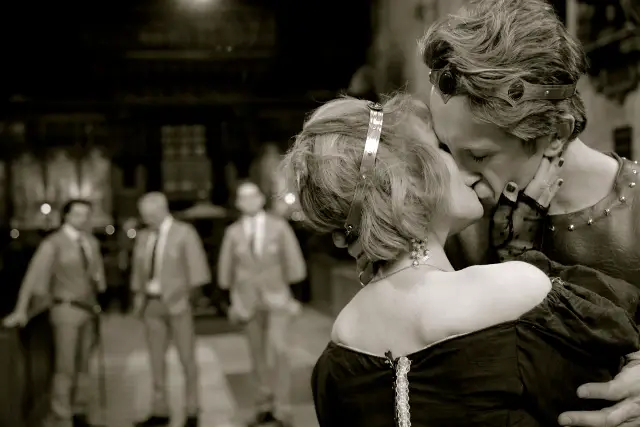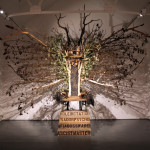Our thanks to Jonathan Dodd for this cultural review. Ed
Edward II was well-chosen as a companion-piece to Richard II. Both are about the fall of English kings, Edward being Richard’s great-grandfather. Both were written by great playwrights, although Marlowe’s was published first, posthumously. Both deal with similar themes in very different ways.
Where Richard II was concerned with the struggle to overcome the demands of loyalty and honour amongst a group of essentially well-meaning people, Marlowe deals much more with the realpolitik of power, its acquisition and its temptations.
More important to be seen than to be good
Scena Mundi have found a connection between Edward’s reign and the last two decades of the last century, where power and influence and fashion and pleasure came to the fore, and careers and fortunes were able to flourish and be lost almost in the wink of an eye. In the world or Edward II as portrayed by Marlowe, people were less likely to be concerned with morality and responsibility than with keeping their eyes open to opportunities to profit from. It was more important to be seen than to be good.
The play opened at Holy Trinity Church to a nineties-inspired soundtrack, with the players dressed in a motley mix of 14th century and late 20th century clothes. At first, suits paired with chain mail and a lot of leather and Goth boots seemed strange, but such was the power of the acting, and the sense of overheated reality and raw emotion in the production, that it all worked rather well.
Unhappy barons and a vain but charismatic king
Into the tinderbox of a royal court made up of unhappy barons and a vain but charismatic king arrives Piers Gaveston from exile. He is a favourite of Edward’s, and is installed with high offices and titles, much to the disgust of the barons, who see him as a bad influence on the king and the state of the country.
It appears that Edward and Gaveston are more than just good friends, and Gaveston does indeed come between the king and his subjects as well as Queen Isabella. Edward enjoys the company of his favourite so much that he neglects everything else, and matters quickly come to a head.
A strange mesmeric combination of simultaneous strength and weakness
Edward Fisher plays Edward II in a long red leather jerkin and huge steampunk boots as a vain and capricious character, sure of his own rightness. He strides around the set with his chin out and his hands clasped behind his back, exerting a strange mesmeric combination of simultaneous strength and weakness. He does genuinely love Gaveston, and it seems this love has blinded him to the realities around him. His is a towering performance, the centre of the piece, and all the other players revolve around him.
Gaveston is played by Pip Brignall as a man with a huge chip on his shoulder, raging at the world that doesn’t let him be who he wants to be and who he wants to be with. He is destructive in the way that a huge thwarted talent can be. He is unsympathetic but by no means pitiable, and his pride and refusal to bow to pressure are admirable in some ways but reckless in others. He also genuinely loves Edward, and their enforced separation is unbearable for both of them.
From angry indignation to self-justifying madness
Martin Prest plays Mortimer, a proud baron who can’t bear to see the country going to rack and ruin and sets out with good intentions to rebel against the king, but whose ambition gets the better of him. He ranges from angry indignation to self-justifying madness once he attains the power he craves. Queen Isabella, played by Ava Amande, is at first loving towards her husband and the father of her son, but is driven to turn against him and then to a series of betrayals as events unravel around her. Anna Buckland, as Edward’s brother Edmond, puts in a great performance as a stern warrior who keeps changing sides
Almost all of the characters are shown to be unsympathetic in one way or another, and the play turns into a grim list of deaths as one after the other is captured or betrayed and then dispatched. Their fortunes rise and fall like the tide, until the end, when hope springs again.
A strange dreamlike dance towards death
If you think that this might be a miserable evening’s entertainment, however, you would be very wrong. The staging is spare but powerful, with armed men ranging around, their drawn swords glittering in the half-dark, amid confrontations full of fierce words and huge emotion.
These characters all wear their hearts on their sleeves. It is fascinating to see them moving round each other as if in a strange dreamlike dance towards death. There are moments of sheer cold horror as well, and the language, although less beautiful and poetical than Shakespeare’s, is without doubt strongly-written and wonderfully spoken throughout.
A lot of deserved and satisfying comeuppance
It was a marvellous evening, with strong and memorable performances and a rip-roaring no-holds-barred tragic story of overweening ambition, love-blinded vanity and a lot of deserved and satisfying comeuppance.
I came away with a sense of events concluded in a satisfactory way, glad to breathe the slightly-damp night air, and still enjoying the memory of the last piece of coffee, walnut and date cake provided by the wonderful volunteers during the interval. Thank you all.





